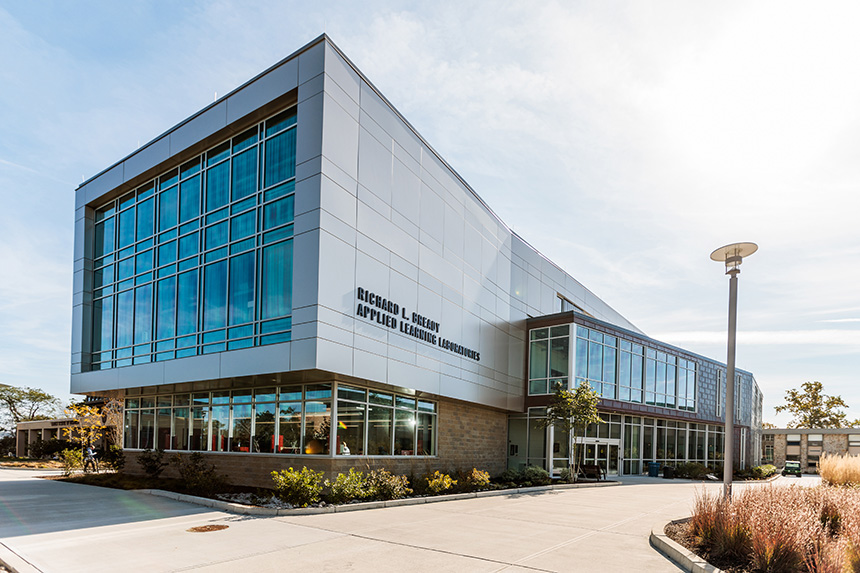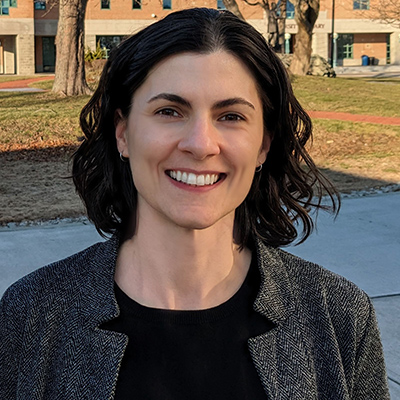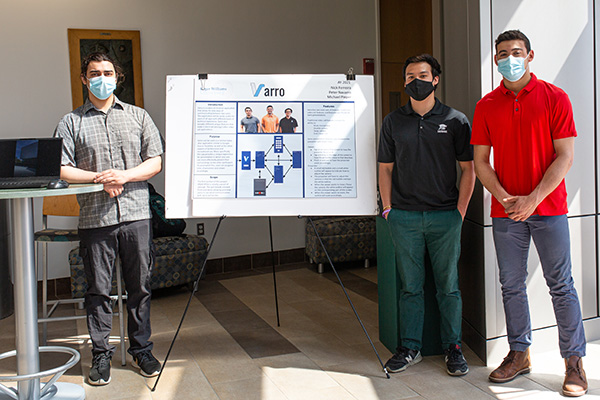Computer Science
With coursework that combines solid theory, real-world practice and specialization options, our Computer Science students are ready for high-demand career fields from app developers to large scale software system designers.
The Bachelor of Science in Computer Science is accredited by the Computing Accreditation Commission of ABET, under the General Criteria and the Computer Science Criteria.
To read more about our academic offerings, or to view full course descriptions, please refer to our University Catalog.
Success After Graduation

Placement of Graduates
Through the years, our graduates consistently find success in employment or in graduate schools within six months of graduation.

First Job, Dream Industry
SECCM graduates land their first jobs in their targeted industries, such as engineering, defense, construction, manufacturing, technology, or consulting.

Average Starting Salary
of 2022 SECCM graduates.
Degree Requirements
SECCM FAQ
Does SECCM accept Advanced Placement (AP) credits?
Please visit Advanced Placement for all your questions about AP credits.
How can I redo my math placement?
You can take the online Math placement up to two times. A third time may be allowed as an in-person exam. Please visit Placement by Subject for more information on Math placement and how to register for the online or in-person exam.
What is the writing placement process?
Writing Placement at RWU is determined by a directed self-placement survey. Directed self-placement helps students decide which first-year writing course will be best for them. Please visit Placement by Subject for more information on Writing placement.
Computer Science FAQ
What is the difference between the Bachelor of Arts (BA) and the Bachelor of Science (BS) degrees in Computer Science?
The BS is oriented toward those who intend to work in areas such as Software Engineering, Software Development, or Applications Development. It covers a broad spectrum of the field incorporating courses in hardware, software, and theory. It has a significant mathematics component. Graduates typically work within the software industry as developers or will be on the software development team within other industries (such as medical device controllers or financial firms). The BS degree is accredited by ABET.
The BA is oriented toward those with a strong interest in computer science but also those who want to pursue other opportunities as an undergraduate. It is predominantly software-oriented, but students have significant flexibility in selecting computer science electives. This degree provides an opportunity to dual-major in many other areas or to pursue several minors. Graduates working in the software industry tend to be on sales and training teams or as part of requirements teams. The BA also can be a second major and may supplement the student’s primary major with a strong technical focus.
Can I transfer from BS to BA after the first year?
Students beginning the BA or BS in their first year have a common first-semester experience. The curricula, while still including significant overlap, do not diverge until the second semester. Students beginning their first year can complete either program in a typical 8-semester time frame. Students can switch from the BS to the BA, but it is rare to shift from the BA to the BS after the first year. All students have access to advisors who help them make these decisions and select the courses that best suit their interests.
Do you recommend I purchase a laptop with certain specifications?
You can purchase a new laptop or use one you already own if it meets or exceeds the specifications published by RWU’s IT department. Please note that students using Apple-based machines or Chromebooks may need to supplement the operating system to be able to work with Intel-only software packages.
Are there any opportunities for internships or hands-on experience?
Yes! While the Computer Science program does not have a formal internship requirement, most students gain real-world experience through part-time positions, research projects, and industry collaborations. The Center for Career & Professional Development (CCPD) helps students secure internships with leading technology companies, startups, and research institutions.
Hands-on learning is integrated into nearly every course, with students working on coding projects, software development, artificial intelligence, cybersecurity, and data science applications. In their senior year, students complete a two-semester capstone project, typically developing software solutions for real clients from industry, nonprofits, academia, or government organizations.
Students also have opportunities to engage in extracurricular activities such as hackathons, coding competitions, and tech-focused student organizations, which are emerging as valuable ways to develop practical skills and connect with industry professionals. These experiences help Computer Science graduates build strong portfolios and gain a competitive edge in the job market.
Are there any study-abroad opportunities for computer science students?
Yes, our Computer Science students have numerous study-abroad opportunities. CS students who wish to study abroad should discuss their plans with their academic advisors as early as possible, ideally at least a year before they intend to travel. Typically, students go abroad during the spring semester of their third year. Many students wonder if they can still graduate in four years, and the answer is yes, provided they follow the program guidelines and meet the requirements set by their advisors and the Study Abroad office.
It is becoming increasingly common for our Computer Science students to opt for short-term study-abroad experiences by taking summer courses. There are numerous summer course options, with the core senior seminar being a popular choice for summer study abroad, typically between junior and senior years.
Learn more by visiting RWU’s study abroad web page.
Are there any opportunities for networking or professional development?
Students in the program can join professional groups such as the ACM or IEEE. As student members, they have access to journals, webinars, and various meetings. There is also an IEEE student club in the SECCM. Don’t forget also to check out our Computer Science and Scripting student group where you can learn more and network around emerging technologies and unique coding languages. Visit our Student Clubs and Organizations page for a full list of student groups.
Can I take classes part-time or online?
The Computer Science program is designed as a full-time, in-person program to be completed in eight semesters. While the majority of required courses are offered in-person, there are some online course options that provide additional flexibility during your time here. However, it is not possible to complete the entire degree online.
This in-person format allows students to engage in hands-on learning, collaborate closely with faculty and peers, and take advantage of on-campus resources, including labs, research opportunities, and industry networking events. That said, many of our students successfully work part-time while completing their degree.
What is the typical class size for computer science courses?
Most computer science courses have 15 to 20 students, allowing for personalized instruction and close interaction with faculty. Class sizes may vary depending on faculty availability, but our program is designed to maintain small, engaging learning environments that support hands-on learning and collaboration.
Can I do a minor in another program?
Yes! Computer Science (BA) students can pursue multiple minors, and many choose to double major or combine their degree with one or more minors.
For Computer Science (BS) students, completing the program requirements automatically earns them a minor in Mathematics. Additionally, some BS students pursue a second minor, with Cybersecurity being a popular choice.
One of the advantages of studying at RWU is the ability to explore over 70 minors across diverse fields, including Business, STEM, Arts, Social & Public Sciences, Law, Health Care, and more. This flexibility allows students to customize their computer science degree to align with their interests and career goals.
Full list of majors and minors offered at RWU.
How does the program support securing a job post-graduation?
While the program itself does not have a dedicated job placement service, our students often find part-time positions during their studies that transition into full-time employment upon graduation. The Center for Career and Professional Development at RWU offers various career-focused services, including resume reviews, career fairs, and alumni panels, to help students connect with potential employers. Typically, about 90% of graduates secure positions in the technology field within six to eight months after graduation, with competitive starting salaries for the region.
What kinds of career opportunities are available for the graduates?
Our graduates have an exciting array of career opportunities! They work in diverse fields, from the defense industry to top tech companies like Wayfair and Google. Many excel in the financial sector, while others thrive in data analytics. The possibilities are endless, as computer science professionals are in demand across nearly every industry.
What research opportunities exist?
Research opportunities for Computer Science students at RWU are diverse! Many faculty grants and projects across various fields include computer science components, allowing our students to collaborate on interdisciplinary research. For example, our Computer Science students often work with faculty from the construction management and engineering programs, getting paid to conduct research under their guidance. RWU emphasizes hands-on learning opportunities, and faculty-student research projects are a big part of this approach. Senior design projects also frequently include research components.
If you are interested in participating in student-faculty research projects, talk to your academic advisor or the Dean’s office for more information.
State-of-the-Art Facilities

The newest building on the Bristol campus, the Richard L. Bready Applied Learning Laboratories is designed to foster collaboration and innovation while offering high-tech resources for experiential learning. The three-floor, 27,325-square-foot building features seven cutting-edge laboratories, senior design project rooms and open spaces dedicated to hands-on education. Computer Science students have access to the Computer Science Software Experimentation Lab, the BIM/Virtual Reality Lab, the Advanced Technology and Innovation Lab, collaborative workspaces, project rooms, design labs, and more.
B.A. vs. B.S. in Computer Science: Which Path Fits You?
Students can complete either a Bachelor of Science or a Bachelor of Arts in Computer Science.
Students pursuing either a B.S. or B.A. degree learn the fundamentals of how a computer works, how it stores data, how a programming language is written, how to analyze algorithms, and how to design software. The first semester is the same for all students; during the second semester, B.S. and B.A. candidates take slightly different routes.
In the B.S. program, students use their strong mathematical backgrounds and knowledge of computing to design and build systems that keep organizations functioning and contributing to society. The interdisciplinary B.A. program is less focused on mathematics and is designed for students who are interested in the applications of technology, communications, sales, and other career paths.
Course Highlight: Machine Learning
Tailor Your Expertise with a Specialization
Beginning in your third year, you will have the flexibility to focus your education in a specific area by selecting a specialization. Students may choose from data science, digital systems, human-centered computing, intelligent and autonomous systems, or mathematics, or can consult with their faculty advisor to create a custom specialization.
Data Science Specialization
Data science looks at large and complex data. You’ll learn how to understand, organize, and manipulate it to create solutions that benefit organizations. This specialization is best for students who enjoy analyzing or building algorithms, and exploring large and complex data sets.
Digital System Specialization
This specialization focuses on the hardware of a computer. Students will take a close look at circuits, learn how they are designed, and understand how they interact with software in devices like cell phones.
Human-Centered Computing Specialization
Humans and computers interact on a daily basis and human-centered computing focuses on how humans adapt and organize their lives around technology. This specialization allows students to better understand how to design, develop, and implement computing systems that support human activities.
Intelligent and Autonomous Systems Specialization
Devices like Alexa, Google Home, and Siri are all adapted by learning how computer systems can make decisions and behave autonomously. This specialization allows students to learn about artificial intelligence, and how to build programs and systems to perform certain tasks.
Mathematics Specialization
Data analytics uses a combination of Computer Science, mathematics, and statistics to gain valuable knowledge from data. The application of analytics can be used in a variety of ways for any industry. This specialization is for students who wish to pursue a double major in mathematics, or those who want to pursue studies or careers in the analytical side of computing.
Custom Specialization
Students interested in more than one focus of Computer Science, or those who want as broad an educational experience as possible, can work with their faculty advisor to design a custom specialization perfectly tailored to their interests.
Learn From Faculty Experts
 Sonya Cates, Ph.D.
Sonya Cates, Ph.D.
Associate Professor of Computer Science
Sonya Cates’ interests include human-computer interaction, artificial intelligence, and data science. As a student at MIT, her work focused on the intersection of artificial intelligence and human-computer interaction. Before joining the faculty at Roger Williams University, she worked in finance, using large data sets to predict movements in financial markets.
“My favorite thing about teaching in the Computer Science program at RWU is the small class size," she said. "I can really get to know all of my students and see their progress through all four years.”
Alumni Share Their Experiences
“RWU's Computer Science program provided me with a strong foundation that allowed me to pursue a deeper understanding of my desired specialization. The small class sizes made me feel as though I was having a conversation with my professors as opposed to a lecture. This was the main reason I chose to attend Roger.”
Casey Knight ’22
Major: Computer Science, Intelligent and Autonomous Systems
Full Stack Software Engineer at Fidelity Investments in Merrimack, N.H.
Graduates Work at Top Companies
Our graduates work at top companies, including:
- Fidelity Investments
- Naval Undersea Warfare Center
- Wayfair
- MEDITECH
- Hanover Insurance
- Synchrony Financial
- Raytheon
Work with Real Clients
During senior year, students complete a year-long design project, building a significant software system for a real client. Examples of past projects include:
- MotionFusion: A multi-year project developing an interactive presentation system using 3D cameras.
- ADAM-4: Modernizing a fluids mechanics lab to take advantage of better computing hardware and software.
- Varro: A proof of concept to determine the possibility of remotely accessing and directing a smartphone camera.

- TrickyMaps: A game linking GPS, photographs, and paper maps to develop map reading skills and offer travel entertainment.
- NiCoMi: A system that helps evaluate the effectiveness of social media-based marketing campaigns.
- CPM Scheduling: A software system to help Construction Management students identify ways to reduce scheduling time for projects.
Ways to Get Involved
Computer Science and Scripting Club
The Computer Science and Scripting Club meets on a weekly basis on campus to teach emerging technologies, unique coding languages, and offer aid for student run personal projects. No pre-requisite knowledge required.
Multicultural STEM Alliance
The Multicultural STEM Alliance aims to strengthen the sense of community among students of color in STEM majors at RWU by offering activities, mentorship, and networking opportunities at and outside of the university.


